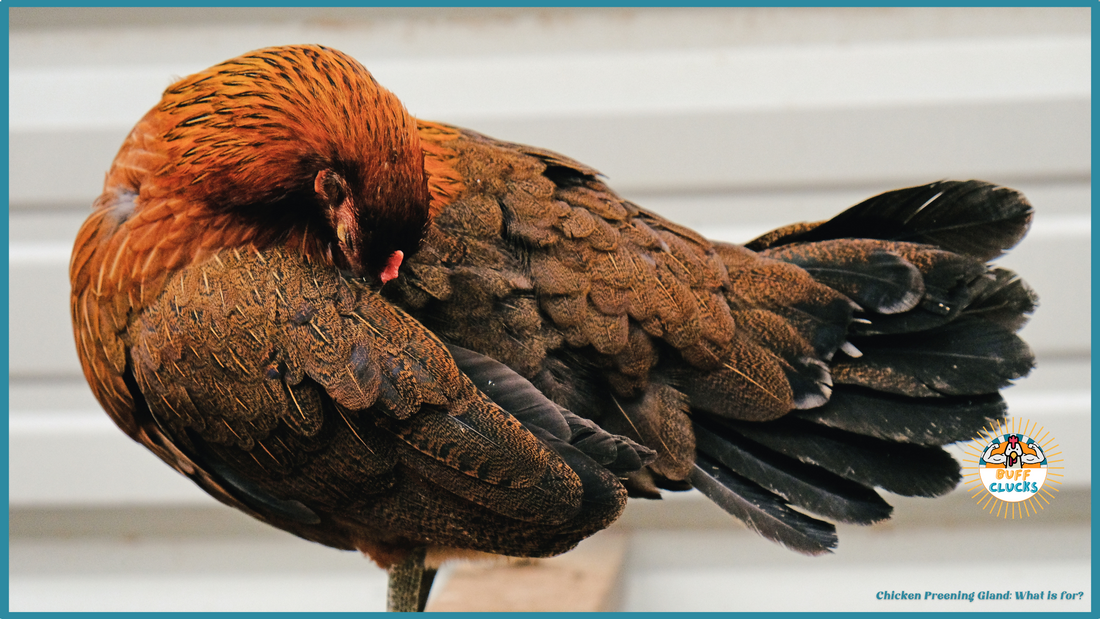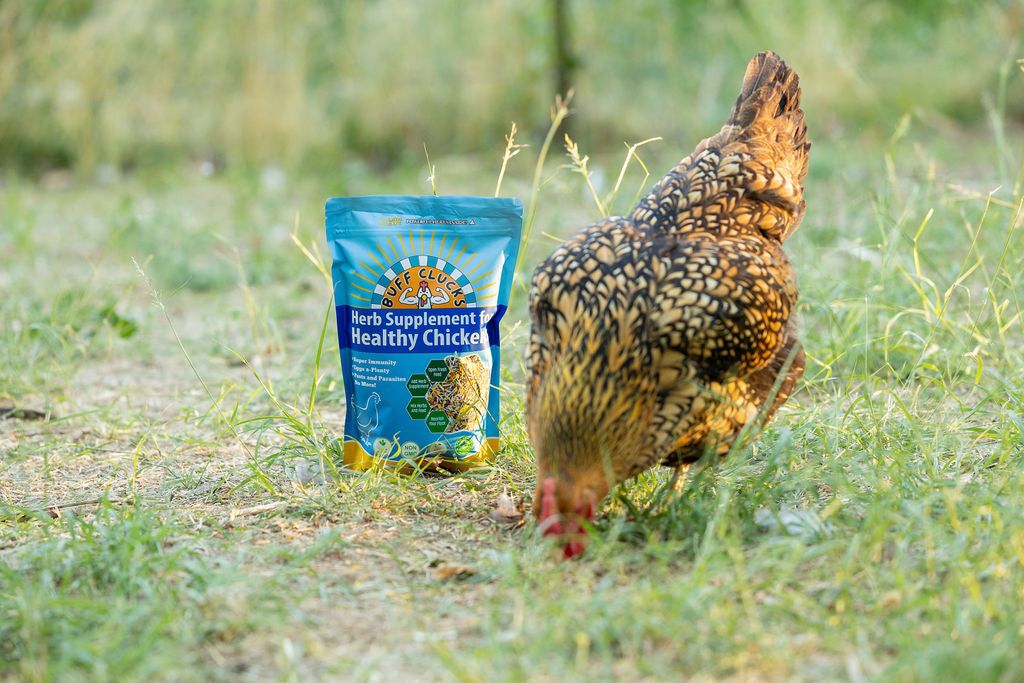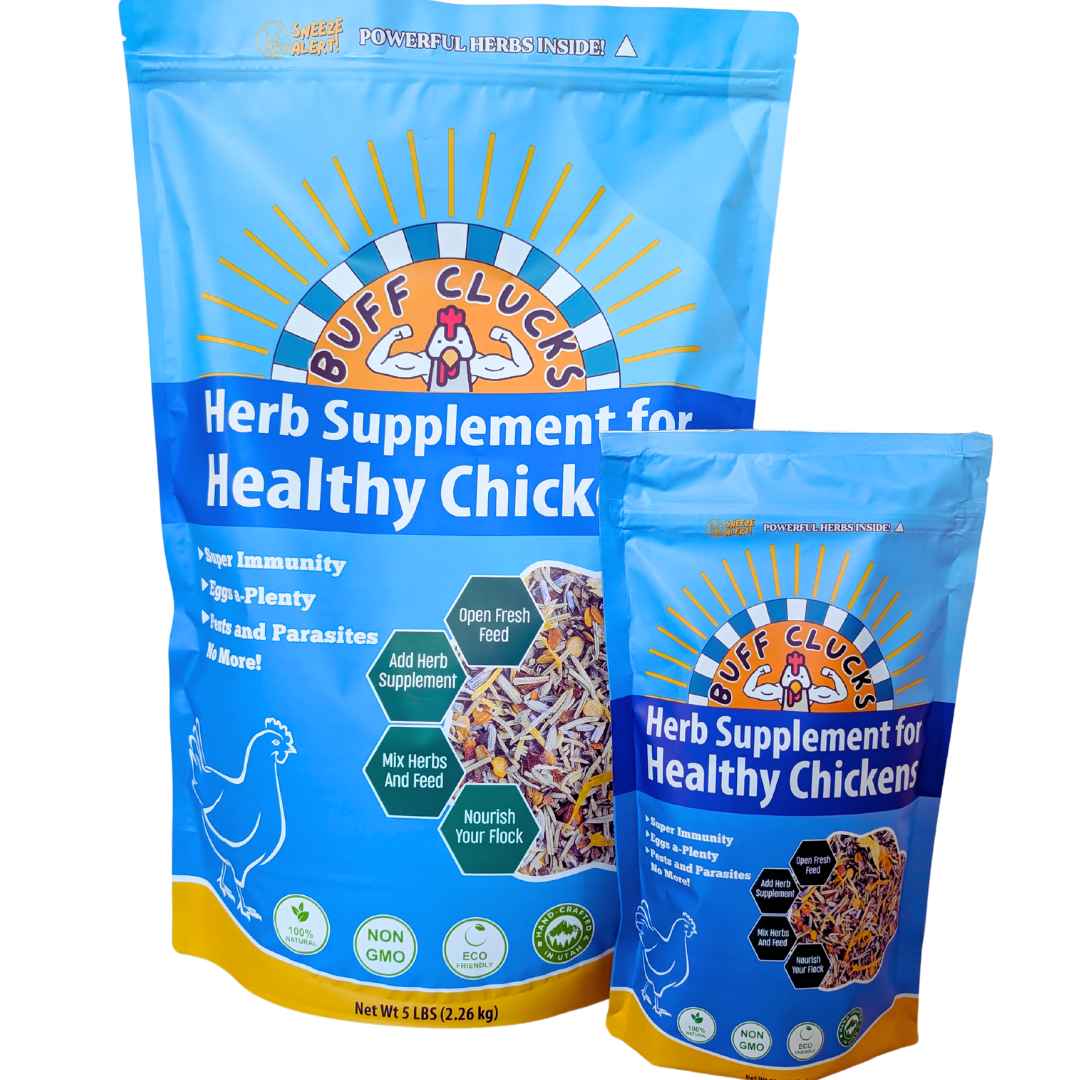50% OFF SITEWIDE
Upgrade your flock’s daily routine with natural herbs trusted by chicken keepers everywhere.

Every chicken spends a good part of its day grooming, fluffing, and pecking at its feathers, but there's more going on than meets the eye. This self-care routine is powered by the chicken preening gland, a small yet essential organ that keeps your flock looking fantastic and feeling healthy. It's nature's built-in grooming kit, ready to handle all feather care needs.
Officially known as the uropygial gland, the chicken preening gland sits discreetly at the base of your chicken's tail. Despite being small, it produces an essential oily substance that helps maintain feathers in tiptop shape. Think of this gland as your chickens' very own skincare expert, diligently ensuring every feather stays in prime condition. Chickens activate the gland by gently pressing their beaks against it, then methodically applying the oil along their feathers, ensuring thorough distribution.
This little gland is more than just a grooming aid. It provides multiple crucial benefits that keep chickens happy and healthy.
The oil secreted by the preening gland creates a protective, water-resistant coating on feathers, helping chickens stay dry even in wet conditions. It's nature’s perfect raincoat, built right into every bird. Chickens that spend a lot of time outdoors, especially in areas prone to frequent rainfall, heavily rely on this waterproof barrier to stay comfortable and avoid illnesses caused by damp feathers.
Consistent preening distributes the gland's oil evenly, resulting in stronger and more flexible feathers. This reduces feather breakage and ensures that chickens stay comfortable and well-protected. Healthy feathers also contribute to better insulation, helping chickens regulate their body temperature effectively throughout different seasons, reducing stress during extreme weather changes.

Regular application of preening oil naturally deters common pests like mites and lice, providing chickens with built-in protection against these troublesome invaders. The preening oil creates an unfavorable environment for parasites, significantly lowering the likelihood of infestations. It’s like having an invisible, feather-friendly bug repellent always at the ready.
Interestingly, preening oil aids in converting sunlight into vitamin D, vital for strong bones and improved egg-laying performance. It's like giving your chickens a daily dose of sunshine. Chickens with proper vitamin D levels lay higher-quality eggs, and they exhibit improved overall health, better feather quality, and stronger immune systems.
Beyond physical benefits, preening is essential for chickens' mental well-being. Regular grooming behavior is calming and stress-relieving, significantly contributing to flock harmony and overall happiness. Chickens that groom frequently are generally calmer and less prone to aggressive behaviors.
It's helpful to understand what normal preening behavior looks like. Healthy preening typically involves:

Occasionally, the chicken's preening gland might encounter problems. Watch out for these signs that indicate a gland issue:
Prompt action is key if you notice any of these issues. A clean coop maintained with CoopShield—Herbal Pest Defense for Chickens can help manage and prevent potential gland problems. If issues persist, consulting a poultry health expert is recommended to diagnose and treat underlying conditions effectively.
To ensure your chickens' preening glands function at their best, follow these simple yet effective tips.
A diet rich in essential nutrients supports feather growth and skin health. Boost your flock's diet with Buff Clucks Herb Supplement for Backyard Chickens, which offers the perfect mix of herbs designed to enhance feather and overall health. Including quality protein, vitamins, and minerals in their daily feed ensures optimal feather condition, vibrant health, and maximum preening effectiveness.

Proper hydration is critical for overall feather health. Adding AquaBoost – Electrolytes and Probiotics for Backyard Chickens to drinking water helps chickens stay hydrated, reduces stress, and improves feather condition. Consistent access to fresh and clean water encourages chickens to drink more, keeping their feathers supple and their bodies well-hydrated.
Clean bedding and coop conditions discourage parasites that can harm feathers. Regular cleaning routines ensure your flock stays comfortable and healthy. Pay special attention to damp areas, which are breeding grounds for parasites. Regularly refreshing nesting boxes and roosting areas minimizes risks associated with feather damage and pest infestation.
Provide ample space and resources for activities like dust bathing and sunning. Natural behavior encourages effective grooming and happier, healthier chickens. Ensuring your coop has designated areas for these activities enhances your chickens' ability to groom themselves naturally, benefiting both feather condition and overall flock harmony.
Periodic health checks allow you to spot potential problems early, ensuring the preening gland remains functional. Regularly inspect your chickens individually to ensure their feathers and skin appear healthy and their grooming behavior remains consistent. This practice will help you detect and resolve gland issues swiftly.
Though often unnoticed, the chicken preening gland plays a starring role in feather care, pest control, and overall chicken health. By supporting it through proper nutrition, hydration, and coop management, you ensure your flock stays vibrant, healthy, and ready for anything Mother Nature throws their way.
So next time your chickens strut their beautifully groomed feathers, remember the hardworking chicken preening gland behind the scenes, making every feather shine.
Subscribe to our newsletter for weekly chicken care tips delivered straight to your inbox, and don’t forget to follow Buff Clucks on Facebook and Instagram to stay in the loop on all things poultry perfection. If your flock loves our tips and products, why not leave a review? We adore hearing your success stories!



Buff Clucks



















